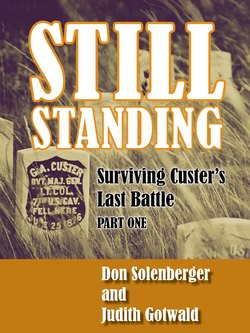Читать книгу Still Standing: Surviving Custer's Last Battle - Part 1 - Judith Gotwald - Страница 3
На сайте Литреса книга снята с продажи.
Foreword
ОглавлениеLife is change. Every decade or so a man or woman of exceptional character and personality crosses life’s stage. When he or she, however rarely, lives to old age, one can sometimes dissect his or her life into chapters of change. History influences lifestyles, preferences, and politics. Change unfolds individually and socially. The segregationist can find himself within a few decades embracing Civil Rights. The warrior accustomed to settling disputes with force can become the distinguished statesman.
And then there are the Alexanders and Mozarts, geniuses at one thing or another, who live short memorable lives recorded and remembered without the seasoning of age. Historians can only wonder how history might have changed if such lives had not been cut short.
The flamboyant Custer is one such life, which still mesmerizes popular culture and the minds of historians. He was first known for the luck that made him a celebrated hero and the youngest general in the Civil War. His record was known for dashing victories. He would not live to learn from his defeat at the battle with the combined strength of all the Plains Indian tribes at the Little Big Horn in 1876. Never was a defeat so celebrated as to become almost honorable, despite the questioning eye of history casting doubts on the decisions made that fateful day.
Custer, cut down in his prime, led a life surrounded by major issues. Less than a scholar, he was becoming acquainted with the issues of his day not by careful study or education but through personal interactions. Custer was a social magnate. He knew the movers and shakers of his day, but he never forgot his humble origins. They plagued him. He was a frontier farmboy who found his way to the United States Military Academy at West Point. In the young United States’ far north, he was best friends with Southerners. His family was staunchly Democratic at a time when Whigs were gaining popularity. He knew what it was like to be an outsider, to be looked down upon.
Custer might have lived to outgrow soldiering. Where might he have turned to satisfy his need to succeed, his need to be noticed? He had a front row seat for many of the defining issues of his era. As a farmer, would his sympathies have been with other farmers in fighting the influence of the railroads and their economic hold on politicians? As a Northerner with strong Southern friendships, would he have been influential in healing relationships with the South beyond Reconstruction? Proud of his battlefield triumphs, would he have shown empathy to his friends in defeat? Would he come to understand the freed slave and a new United States, which pledged inclusiveness? As a military leader, where might he have stood on the post-Civil War American issues of graft and government reform?
We know that Custer continued to enjoy the popular rank of general in the public eye, long after his rank reverted to lieutenant colonel at the end of the War. He returned to military service but was beginning to explore options for private life. He toyed with writing, entrepreneurship and politics.
And what about Libbie, the wife of George Armstrong Custer? Elizabeth Bacon Custer, the devoted Army wife, triumphed over the devastating loss of her husband and three other Custer family members to forge her own identity as a writer and circuit speaker. A key issue of her time was women’s suffrage, and she lived to cast her vote as a female American citizen. The girl from a small frontier town left her Michigan home to live in New York City and to travel the world. How might her life been changed had her famous husband stood by her.
Still Standing asks the big “if.” What if Custer had not died at the Little Big Horn. What would survival have meant not only to the Custers but to their contemporaries? How would a man with the bigger than life personality of George Armstrong Custer emerge from defeat? One can only imagine, but in the imagining, perhaps there is something to learn and a story to tell!
This book is Part 1 of a two part story.
For updates on the story, please visit: gotwaldcreationportfolio.com/still-standing/
